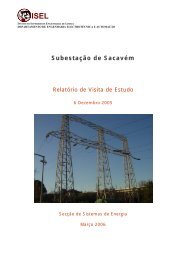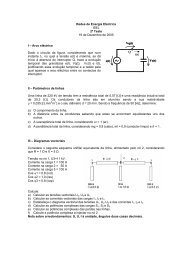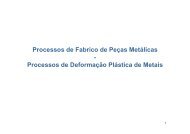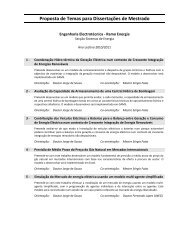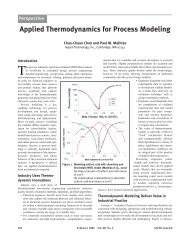- Page 2 and 3:
TEXT FLY WITHIN THE BOOK ONLY
- Page 5:
OUP-43 30-1.71 5,000 OSMANIA UNIVER
- Page 8 and 9:
T. C. BapaneHKoe. C. M. Koean, r Jl
- Page 10 and 11:
TO THE READER MIR Publishers would
- Page 12 and 13:
Contents Sec. 6. Integrating Certai
- Page 14 and 15:
8 Chapter Contents Sec. 13. Linear
- Page 17 and 18:
Sec. 1. Functions Chapter I INTRODU
- Page 19 and 20:
Sec 1] Functions 13 8. Find the rat
- Page 21 and 22:
Sec. 1]_Functions_15 34. Prove that
- Page 23 and 24:
Sec. 2] Graphs of Elementary functi
- Page 25 and 26:
Sec. 2] Graphs of Elementary functi
- Page 27 and 28:
Sec. 2] Graphs of Elementary Functi
- Page 29 and 30:
Sec. 3] Limits 23 For the existence
- Page 31 and 32:
Sec. 3] 179. Hm (Vn + 1 \f~n). n -+
- Page 33 and 34:
Sec. #] Limits 27 209. lim 210. lim
- Page 35 and 36:
^Sec 3] Limits Therefore, Example 9
- Page 37 and 38:
Sec. 31 Limits 31 269. a) 270. lim-
- Page 39 and 40:
Sec. 4] Infinitely Small and Large
- Page 41 and 42:
Sec. 4] Infinitely Small and Large
- Page 43 and 44:
Sec. 5] Continuity of Functions 37
- Page 45 and 46:
Sec. 5]_Continuity of Functions_39
- Page 47 and 48:
Sec. 5] Continuity of Functions 334
- Page 49 and 50:
Sec. 1] Calculating Derivatives Dir
- Page 51 and 52:
Sec. 1] Calculating Derivatives Dir
- Page 53 and 54:
Sec. 2]__Tabular Differentiation_47
- Page 55 and 56:
Sec. 2]_Tabular Differentiation_49
- Page 57 and 58:
Sec. 2] Tabular Differentiation_ 51
- Page 59 and 60:
Sec. 2] Tabular Differentiation 504
- Page 61 and 62:
Sec. 2] Tabular Differentiation 55
- Page 63 and 64:
Sec. 3] The Derivatives of Function
- Page 65 and 66:
Sec. 3] The Derivatives of Function
- Page 67 and 68:
Sec 4] Geometrical and Mechanical A
- Page 69 and 70:
Sec. 4\ Geometrical and Mechanical
- Page 71 and 72:
Sec. 4] Geometrical and Mechanical
- Page 73 and 74:
Sec. 5]_Derivatives of Higher Order
- Page 75 and 76:
Sec. 5]_Derivatives of Higher Order
- Page 77 and 78:
Sec. 6] Differentials of First and
- Page 79 and 80:
Sec. 6}_Differentials of First and
- Page 81 and 82:
Sec. 7]_Mean-Value Theorems_75 745.
- Page 83 and 84:
Sec. 8] Taylor's Formula 77 765. a)
- Page 85 and 86:
Sec. 9]_ V Hospital-Bernoulli Rule
- Page 87 and 88:
Sec. 9] L' Hospital-Bernoulli Rule
- Page 89 and 90:
Chapter III THE EXTREMA OF A FUNCTI
- Page 91 and 92:
Sec. 1] The Extrema of a Function o
- Page 93 and 94:
Sec. 1] The Extrema of a Function o
- Page 95 and 96:
Sec. 1] The Extrema of a Function o
- Page 97 and 98:
Sec. 2]_The Direction of Concavity.
- Page 99 and 100:
Sec. 3]_Asymptotes_93 Example 2. Fi
- Page 101 and 102:
Sec. 3]_Asymptotes_95 Solution. Sin
- Page 103 and 104:
Sec 4] Graphing Functions by Charac
- Page 105 and 106:
CM CM -h CO O non ' > C " -~ a - >
- Page 107 and 108:
Sec. />] Differential of an Arc. Cu
- Page 109 and 110:
Sec 5] Differential of an Arc. Curv
- Page 111 and 112:
Sec. 5]_Differential of an Arc. Cur
- Page 113 and 114:
Sec. 1. Direct Integration 1. Basic
- Page 115:
Sec 1] Direct Integration_109 1048*
- Page 119 and 120:
Sec. 2] Integration by Substitution
- Page 121 and 122:
Sec. 2] Integration by Substitution
- Page 123 and 124:
Sec. 3\_Integration by Parts_H7 Exa
- Page 125 and 126:
Sec 4] Standard Integrals Containin
- Page 127 and 128:
Sec. 5] Integration of Rational Fun
- Page 129 and 130:
Sec. 5] In t egration of Rational F
- Page 131 and 132:
Sec. 6] Integrating Certain Irratio
- Page 133 and 134:
Sec. 6] Integrating Certain Irratio
- Page 135 and 136:
Sec. 7]_Integrating Trigonometric F
- Page 137 and 138:
Sec. 7]_Integrating Trigonometric F
- Page 139 and 140:
Sec. 8] Integration of Hyperbolic F
- Page 141 and 142:
Sec. 11] Using Reduction Formulas 1
- Page 143 and 144:
Sec. 12] Miscellaneous Examples on
- Page 145 and 146:
Sec. 1] The Definite Integral as th
- Page 147 and 148:
Sec. 2]_Evaluating Definite Integra
- Page 149 and 150:
Sec. 3]_Improper Integrals_143 Sec.
- Page 151 and 152:
Sec. 3] Improper Integrals 145 Solu
- Page 153 and 154:
Sec. 4] Change of Variable in a Def
- Page 155 and 156:
Sec. 5] Integration by Parts 149 Bu
- Page 157 and 158:
Sec. 6] Mean-Value Theorem 151 In p
- Page 159 and 160:
Sec. 7] The Areas of Plane Figures
- Page 161 and 162:
Sec. 7] The Areas of Plane Figures
- Page 163 and 164:
Sec. 7\_The Areas of Plane Figures_
- Page 165 and 166:
Sec. 8] The Arc Length of a Curve 1
- Page 167 and 168:
Sec, 9] Volumes of Solids 161 1673.
- Page 169 and 170:
Sec. 9] Volumes of Solids 163' Solu
- Page 171 and 172:
Sec. 9]_Volumes of Solids_165 1693.
- Page 173 and 174:
Sec. 10] The Area of a Surface of R
- Page 175 and 176:
Sec. II] Moments. Centres of Gravit
- Page 177 and 178:
Sec 11] Moments. Centres of Gravity
- Page 179 and 180:
&?c. 12] Applying Definite Integral
- Page 181 and 182:
Sec. 12] Applying Definite Integral
- Page 183 and 184:
Sec. 12] Applying Definite Integral
- Page 185 and 186:
Sec. 12] Applying Definite Integral
- Page 187 and 188:
Sec. 1) Basic Notions [SI Putting *
- Page 189 and 190:
Sec. 1]_Basic Notions_183 1790*. Le
- Page 191 and 192:
Sec. 3] Partial Derivatives 185 180
- Page 193 and 194:
Sec. 4]_Total Differential of a Fun
- Page 195 and 196:
Sec. 4}_Total Differential of a Fun
- Page 197 and 198:
Sec. 5]_Differentiation of Composit
- Page 199 and 200:
Sec. 6]_Derivative in a Given Direc
- Page 201 and 202:
Sec. 6] Derivative in a Given Direc
- Page 203 and 204:
Sec. 7]_Higher-Order Derivatives an
- Page 205 and 206:
Sec. 7] Higher-Order Derivatives an
- Page 207 and 208:
Sec. 7]_Higher-Order Derivatives an
- Page 209 and 210:
Sec. ti\_Integration of Total Diffe
- Page 211 and 212:
Sec. 9]_Differentiation of Implicit
- Page 213 and 214:
Sec. 9] Differentiation of Implicit
- Page 215 and 216:
Sec. 9]_Differentiation of Implicit
- Page 217 and 218:
Sec. 10]_Change of Variables_2H 196
- Page 219 and 220:
Sec. 10]_Change of Variables_213 or
- Page 221 and 222:
Sec. 10] Change of Variables 215 an
- Page 223 and 224:
Sec. 11]_The Tangent Plane and the
- Page 225 and 226:
Sec. 11]_The Tangent Plane and the
- Page 227 and 228:
Sec. 12] Taylor's Formula for a Fun
- Page 229 and 230:
Sec. 13]_The Extremum of a Function
- Page 231 and 232:
Sec. 13] The Extremutn of a Functio
- Page 233 and 234:
Sec. 14] Finding the Greatest and S
- Page 235 and 236:
Sec. 14] Finding the Greatest and S
- Page 237 and 238:
Sec. 15] Singular Points of Plane C
- Page 239 and 240:
Sec. 16] Envelope 233 Solution. The
- Page 241 and 242:
Sec. 18] The Vector Function of a S
- Page 243 and 244:
Sec. 18]_The Vector Function of a S
- Page 245 and 246:
Sec. 19] The Natural Trihedron of a
- Page 247 and 248:
Sec. 19] The Natural Trihedron of a
- Page 249 and 250:
Sec. 20] Curvature and Torsion of a
- Page 251 and 252:
Sec. 20]_Curvature and Torsion of a
- Page 253 and 254:
Sec. 1] The Double Integral in Rect
- Page 255 and 256:
Sec. 1] The Double Integral in Rect
- Page 257 and 258:
Sec. 1] The Double Integral in Rect
- Page 259 and 260:
Sec. 2]_Change of Variables in a Do
- Page 261 and 262:
Sec. 2]_Change of Variables in a Do
- Page 263 and 264:
Sec 3]_Computing Areas_257 2177. Co
- Page 265 and 266:
Sec. 5]_Computing th Area* of Surfa
- Page 267 and 268:
Sec. 6]_Applications of the Double
- Page 269 and 270:
Sec. 7] Triple Integrals 2o3 Evalua
- Page 271 and 272:
Sec 7\ Triple Integrals 265 We ther
- Page 273 and 274:
gee. 7]_Triple Integrals_267 2251.
- Page 275 and 276:
Sec. 8] Improper Integrals Dependen
- Page 277 and 278:
Sec. 8]_Improper Integrals Dependen
- Page 279 and 280:
See. 9] Line Integrals 273 Test for
- Page 281 and 282:
Sec. 9]____Line Inlegtah____275 whe
- Page 283 and 284:
Sec. 9]_Line Integrals__277 express
- Page 285 and 286:
Sec. 9] Lim Integrals 279 (/-axis;
- Page 287 and 288:
Sec 9] Line Integrals 281 Evaluate
- Page 289 and 290:
Sec. 9] Line Integrals 2S& D. Appli
- Page 291 and 292:
Sec. 10] Surface Integrals 285 When
- Page 293 and 294:
ec. 11]_The Ostrogradsky-Gauss Form
- Page 295 and 296:
Sec. 12] Fundamentals of Field Theo
- Page 297 and 298:
Sec. 12] Fundamentals of Field Theo
- Page 299 and 300:
Sec. 1. Number Series Chapter VIII
- Page 301 and 302:
Sec. 1]_Number Series_295 c) D'Alem
- Page 303 and 304:
Sec /\_Number Series_297 Note. For
- Page 305 and 306:
2418. + + 0419 J___1_ . 4- 4- 4- '
- Page 307 and 308:
Sec. 1] Number Series 2464. cos-2-)
- Page 309 and 310:
Sec. 1]_Number Series_303 - V r(2-Q
- Page 311 and 312:
Sec. 2]_Functional Series_305 In th
- Page 313 and 314:
Sec. 2]_Functional Series_307 [the
- Page 315 and 316:
Sec. 2] Functional Series 309 Deter
- Page 317 and 318:
Sec. 3]_Taylor's Series_311 v8 s r
- Page 319 and 320:
Sec. 3] Taylor's Series 313 Since a
- Page 321 and 322:
Sec 3} Taylor's Series 315 2615. ln
- Page 323 and 324:
Sec. 3] Taylor's Series 317 2651. F
- Page 325 and 326:
Sec. 4] Fourier Series 319 If a fun
- Page 327 and 328:
Sec. 4\__Fourier Series _321 2690.
- Page 329 and 330:
Sec 1 1 Verifying Solutions 323 It
- Page 331 and 332:
Sec. 21 First-Order Differential Eq
- Page 333 and 334:
Sec. 3] Differential Equations with
- Page 335 and 336:
Sec. 3\ Differential Equations with
- Page 337 and 338:
Sec. 4]_First-Order Homogeneous Dif
- Page 339 and 340:
Sec. 5] Bernoulli's Equation 333 Co
- Page 341 and 342: Sec. 6] Exact Differential Equation
- Page 343 and 344: Sec. 7] First-Order Differential Eq
- Page 345 and 346: Sec 8]_The Lagrange and Clairaut Eq
- Page 347 and 348: Sec. 9] Miscellaneous Exercises on
- Page 349 and 350: Sec. 9] Miscellaneous Exercises on
- Page 351 and 352: Sec. 10] Higher-Order Differential
- Page 353 and 354: Sec. 10]__Higher-Order Differential
- Page 355 and 356: Sec. 11]_Linear Differential Equati
- Page 357 and 358: Sec. 12] Linear Differential Equati
- Page 359 and 360: Sec. 12] Linear Differential Equati
- Page 361 and 362: Sec. 12] Linear Differential Equati
- Page 363 and 364: Sec. 14]_Euler's Equations__357 Fin
- Page 365 and 366: Sec. 15]_Systems of Differential Eq
- Page 367 and 368: .Sec. 16} Integration of Differenti
- Page 369 and 370: Sec. 17] Problems on Fourier's Meth
- Page 371 and 372: Sec. 17]_Problems on Fourier's Meth
- Page 373 and 374: Chapter X APPROXIMATE CALCULATIONS
- Page 375 and 376: Sec. 1] Operations on Approximate N
- Page 377 and 378: Sec. /]_Operations on Approximate N
- Page 379 and 380: Sec, 2] Interpolation of Functions
- Page 381 and 382: Sec. 2] Interpolation of Functions
- Page 383 and 384: Sec. 3]_Computing the Real Roots of
- Page 385 and 386: Sec. 3]_Computing the Real Roots of
- Page 387 and 388: Sec. 3]_Computing the Real Roots of
- Page 389 and 390: Sec. 4] Numerical Integration of Fu
- Page 391: Sec. 5] Numerical Integration of Or
- Page 395 and 396: Sec. 5] Numerical Integration of Or
- Page 398 and 399: Table 3. Basic Table for Calculatin
- Page 400 and 401: 394 Approximate Calculations \Ch 10
- Page 402 and 403: ANSWERS Chapter I 1. Solution. Sinc
- Page 404 and 405: 398 Answers Form a table of values:
- Page 406 and 407: 400 Answer* 271. Solution. If x & k
- Page 408 and 409: 402 Answers b) /'(!)= lim 1^15^= li
- Page 410 and 411: 404_Answers 494. , . 495. - - . 1 2
- Page 412 and 413: -406 Answers 640. Hint. The equatio
- Page 414 and 415: 408_Answers_ 755. e xcosa sin(*sina
- Page 416 and 417: 410_Answers_4 where R is the radius
- Page 418 and 419: 412 Answers 1/~JT f Q \ J/max = TT=
- Page 420 and 421: 414 Answers 976. j/mi n =1.32 when
- Page 422 and 423: 416 Answers 1037. j/ 1040. 3x* 13 J
- Page 424 and 425: 418 1 1137. 4- 6 3a . In I ocot3x|
- Page 426 and 427: 420 Answers 4^8 Problem 1218*. 1221
- Page 428 and 429: 422 Answers X arctan(* + 2). 1294.
- Page 430 and 431: 424 Answers sin 5* , 1374. -!- 1377
- Page 432 and 433: 426 Answers 3 1442. In l-x2 ' '" 2
- Page 434 and 435: 428_Answers_ the function /(x) = --
- Page 436 and 437: 430 Answers 1651. 3na 2 . 1652. n(b
- Page 438 and 439: 432 Answers inertia /=Y 2jttf 1 r *
- Page 440 and 441: 434 Answers along the large lower s
- Page 442 and 443:
436 Answers cos^. ,810. * ox x* x d
- Page 444 and 445:
438_Answers 1905. 1914. u(*. !/) =
- Page 446 and 447:
440 Answers 1983. 3* + 4j/-H2z 169
- Page 448 and 449:
442 Answers is ~ |/2 + -~=, the alt
- Page 450 and 451:
444 Answers (binormal). 2103. bx *=
- Page 452 and 453:
444_Answers_x = \ ' > (principal no
- Page 454 and 455:
446 Answers 2 a a a 2139. ( dy(f(x,
- Page 456 and 457:
448_Answers_ r 4 **/* [ rj-cos*(p--
- Page 458 and 459:
450 Answers 2243. 2244. 1 i VT=T* ^
- Page 460 and 461:
452 Answers 2 t 2297. ) ~ll . |-[(I
- Page 462 and 463:
454_Answers__ TtD the flux, use the
- Page 464 and 465:
456__Answers_ and when x | ^ =- , t
- Page 466 and 467:
458 Answers
- Page 468 and 469:
460 Answers %-l n=o (n)=^=%. 2873.
- Page 470 and 471:
462 Answers Chapter IX 2704. Yes. 2
- Page 472 and 473:
464 Answers 2822. g-C*+; y=2*. 2824
- Page 474 and 475:
466 Answers x + C z . 2914. #=
- Page 476 and 477:
468_Answers_ A $007. 1) x = C cosco
- Page 478 and 479:
470 Answers 3081. x = C l e 3082. x
- Page 480 and 481:
472 Answers ,*. f (2"+ 1)JtJf dx. H
- Page 482 and 483:
474 Answers 3131. a) 0.211; 0.389;
- Page 484 and 485:
476 Appendix III. Inverse Quantitie
- Page 486 and 487:
478 Appendix IV. Trigonometric Func
- Page 488 and 489:
480 Appendix VI. Some Curves (for R
- Page 490 and 491:
482 Appendix 11. Graphs //-=secx an
- Page 492 and 493:
486 Appendix 24. Strophoid, * u s^-
- Page 494 and 495:
Absolute error Absolute value 367 o
- Page 496 and 497:
490 Index Differential equations of
- Page 498 and 499:
492 Index Infinite discontinuities
- Page 500 and 501:
494 Index Operator Hamiltonian 288
- Page 502:
496 Index Taylor's series Term 311,



